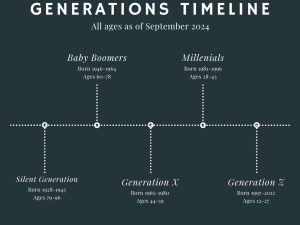Face-to-face conversation or texting? Newspaper or social media? These are questions that often separate older and younger generations. While they seem extremely trivial, they represent a greater difference between generations.
Generational divides are not a modern creation. For decades, older generations have always seen the youth as immature, whether it comes to work, finance, or general social interaction. In a 2019 study by John Protzko for Science Advances magazine, Protzko discovered that adults aged 33 to 51 saw that today’s youth were less capable in areas that the older generation excel at, including respecting elders and reading. Protzko describes this phenomenon as the “kids these days” effect and cites a nostalgic bias to our adolescence as the reason.

While Protzko offers a psychological reasoning behind generational conflict, there is more to the divide. A prominent cause in the U.S. exists with how younger generations feel they are not represented in the government. According to a 2023 article from CNN, millennials are the most dominant generation in America, yet it’s taking longer for them to get representation in Congress than it did for boomers and the silent generation. The lack of a voice in the country’s future can develop into a disdain for the decisions that older generations make.
Social media has also commonly been cited as a reason for a generational gap. A 2023 survey by McKinsey Health Institute found that while more than 75% of all respondents across generations use social media daily for at least ten minutes a day, Generation Z and millennials use it significantly more often, with 35% of Gen Z saying they spend more than 2 hours on social media daily. Whether it be through passive consumption or active posting and messaging, social media shapes the youth culture, which makes it harder for them to connect with their elders.
Stats like this can make it seem obvious that less social media would create more bonds across generations. But, the reality is that cultural differences between generations have always existed and will continue to exist; that is just the nature of a constantly evolving world. So how can these differences be overcome to mend generational relationships?
Differences in generations is not inherently a harmful thing. Having different perspectives is essential to creating an interesting and progressive world. The issue is when differences make it too hard to communicate and work together. When older generations view younger ones as incapable, it makes it impossible for them to grow and become unique people. Intergenerational respect needs to exist for any progress to be made.
It’s the responsibility of everyone to make sure that the next generations do not feel resentment towards their predecessors. Having good intergenerational relationships is essential to creating a better tomorrow.